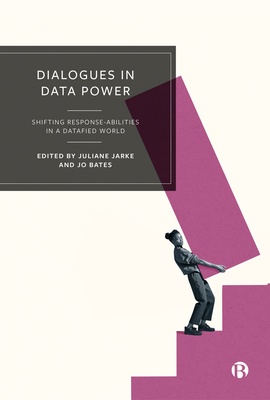new chapter on "In/visibilities in Data Studies: Methods, Tools, and Interventions"
October 17, 2024

I contributed to a chapter on “In/visibilities in Data Studies: Methods, Tools, and Interventions” in a new open access book on Dialogues in Data Power: Shifting Response-abilities in a Datafied World co-edited by Juliane Jarke and Jo Bates.
Here’s the book blurb:
This book presents emerging themes and future directions in the interdisciplinary field of critical data studies, loosely themed around the notion of shifting response-abilities in a datafied world. In each chapter an interdisciplinary group of scholars discuss a specific theme, ranging from questions around data power and the configuring of data subjects to the intersection of technology and the environment. The book is an invaluable dialogue between disciplines that introduces readers to cutting edge arguments within the field. It will be a key resource for scholars and students who require a guide to this rapidly evolving area of research.
Here’s an extract of my contribution to the chapter:
How to study what data makes (in)visible and with what consequences? The sections in this chapter explore methods, approaches, tools, and interventions for accounting for the social lives of data in society – from tracing frictions and fixes, to following journeys and histories, to making freedom of information requests, maps, and visualizations. In being invited to serve as a discussant for this chapter and to surface connections with my own work, I ruminate on resonances with shared research practices for studying data – the details of what is done, what is asked, what is noticed – as well as on how different ways of accounting for data can make a difference.
As alluded to throughout the chapter, feminist science and technology studies scholars emphasize situated and relational approaches – with particular attentiveness to who and what is missing, who and what might be affected by but absent from the shaping of technoscience. Susan Leigh Star wrote memorably of her dedication to studying relations between ‘lived experiences’, ‘technologies’, and ‘silences’ (Star, 2007). Donna Haraway encourages ‘staying with the trouble’, ‘nurturing capacities to respond’, and ‘cultivating ways to render each other capable’ (Haraway, 2016). Feminist data scholars also emphasize ethics of care (Taylor, 2020; Fotopoulou, 2021), the possibilities and politics of refusing data (Barabas, 2022; Garcia et al, 2022), and affirming epistemic plurality, counter-narratives, and marginalized perspectives (D’Ignazio and Klein, 2020).
These approaches may provide methodological inspiration and orientation in studying data. In a recent project studying open data portals, which may be considered devices for making data public, data request mechanisms provide an indication of datasets which were sought but not found (Gray, 2023).1 Just as Mimi Ọnụọha’s Library of Missing Datasets provides a ‘repository of those things that have been excluded in a society where so much is collected’,2 so gathering unsuccessful requests from portals around the world may provide an indication of data considered missing, users left disappointed, questions unanswered, and how data practices, policies, and portals have failed to live up to aspirations and expectations. As well as disclosing details about data infrastructures, data portal interfaces may disclose the failure of arrangements meant to inform. Attending to and articulating trouble has become part of digital culture and society (Meunier et al, 2021), as well as a way to situate and reflect on taken-for-granted digital practices (van Geenen et al, 2023).
How might data studies modify data practices? How can methodological enactments for understanding and situating data (whether through tracing data journeys and frictions, maps, or information requests) make a difference to its role in culture, society? As part of a collaboration between those who do and study data journalism, we identified themes and challenges for ‘critical data practices’ (Bounegru and Gray, 2021). For example, drawing on a chapter by Helen Verran (2021) on narrating numbers and staying with the trouble of value, we considered how data journalists might tell stories both with and about data – that is, both using data as a medium for exploring and narrating issues, as well as reporting on the making of data.
Reporting on data (in)visibilities may be relevant for both those using and those studying data in society – as illustrated by a 2021 Washington Post piece exploring what carbon emissions data suggests about both the emission of carbon as well as the making of data.3 Such approaches to following data in society may suggest a shift from looking at datasets as resources, to exploring how data infrastructures embody relations between actors, organizations, processes, and methods – and how other kinds of datasets may be made and other arrangements may be composed (Gray et al, 2018).
The more-than-academic relevance of investigating data infrastructures and data (in)visibilities may also surface through collaborations which could be characterized as inventive or experimental (Lury and Wakeford, 2012; Lezaun et al, 2016). As well as critically reconsidering conventional infrastructures and outputs of scholarly communication – from societies to monographs to pay-walled peer reviewed journal articles (Eve and Gray, 2020) – the modification and hybridization of formats may provide generative entrypoints for exploring the broader salience of data studies (de Mourat et al, 2020). Careful attention to how questions are formulated, problems are articulated, methods are enacted, and communities are assembled may enrich collaborative investigations with and about data (Gray et al, 2022). Thinking along with feminist science and technology studies, the kinds of methods, tools, and approaches outlined in this chapter may contribute not only to the study of data in society (including scrutinizing its role in the social production of invisibilities, absence, and marginalization) but also to its unscripting, taking-apart, respecification, repurposing, and recomposition.